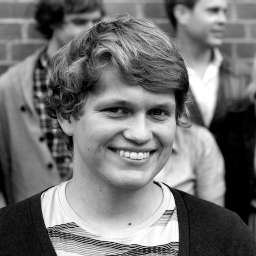Above the main stage of the old Royal Theatre in Copenhagen, hang the words “Ei blot til lyst” (Not only for pleasure). In Stefan Herheim’s production of Alban Berg’s Lulu, this mantra stands at the very centre, the result being an uncomfortably comical, deeply tragic and ultimately very human performance. Combined with at times superb singing, the results were spectacular.
In Herheim’s Lulu, the set is dominated by a recreation of the Royal Danish Theatre’s main stage, “Ei blot til lyst” emblazoned across the top. The idea of performance, what is presented on and off-stage dominates the production. When Lulu is being painted by Walter in the first act, it all happens backstage. When Lulu’s then husband, the elderly Dr. Göll, arrives only to find her and Walter together, he promptly dies of a heart attack. In the next scene, when Lulu has married the painter, the stage has turned, presenting their marriage like some sort of play. Married life is nothing but a performance for Lulu. Pure theatre.
Overseeing the action, almost constantly, is a group of clowns, acting as an on-stage band, and commenting on the action through silent, often lewd gestures. As each of Lulu’s husbands die, be it through surprise heart attack or murder, the clowns descend to the stage and turn the bodies into one of them. Clearly, these zombie clowns are all former lovers and husbands of Lulu, her sexual magnetism extending even beyond the grave. The clowns become increasingly involved in the action until even Lulu’s lovers are clowns. Both the Schoolboy and the Athlete are wearing the grotesque clown make-up. At the Marquis’s party in Act 3, almost all the guests have donned clown make-up, and their outfits generally include references to how they died. In the end, only three humans remain: Alwa, Countess Geschwitz and Lulu. Lulu’s killer is no longer Jack the Ripper, but instead the clown ghost of Dr Schön. Her murder takes on a feeling of ritual sacrifice. Is it the revenge of her former lovers, or do they want her to join them?
Vocally, the production was almost surprisingly strong, soloists largely drawn from the opera house’s own ensemble. Sine Bundgaard, who is due to take on the role later in the run, stepped in for the indisposed Gisela Stille, and triumphed in the marathon role of Lulu. Bundgaard’s voice is large, yet almost surprisingly agile, with gleaming high notes. She has a wonderful sense of line, making musical sense of the large intervals with apparent ease. She is also a wonderful actor, and her transformation from seductress to human wreck was thrilling to watch.
As the painter Walter von Schwarz, Gert Henning Jensen gave a wonderfully ardent portrayal. His voice is rather bright with a thrilling top, although the lower register tended to get lost in the orchestra. Ralf Lukas as Dr Schön/Jack the Ripper sang with authority and was especially chilling in the final scene. Tuva Semmingsen was a delight to watch, from her shy, infatuated Dresser, to her slightly too eager Schoolboy to her grotesquely funny Groom in the final act. Alongside Bundgaard’s Lulu, Randi Stene’s magnificently butch Countess Geschwitz. Already from her first appearance in Act 2, the character seemed certain that her affair with Lulu was doomed, and yet she continued to pursue her. Stene’s singing was imbued with a kind of tragic inevitability. She knows what will happen, but is completely helpless.
The orchestra, led by Michael Boder, seemed to revel in the sheer colour of Berg’s score. The approach to the music emphasised its lyrical character, the richness, especially of the strings, but also the outright savagery. There was also some truly excellent playing from the on-stage band in Act 3, especially from Rikke Yde, dressed in some rather fetching leopard print tails.
Herheim’s production of Alban Berg’s Lulu constantly balances the grotesquely comical and the deeply tragic, finally coming down on the side of the latter. Paired with excellent singing and orchestral playing, it is an extremely effective piece of theatre. “Not only for pleasure,” indeed.




